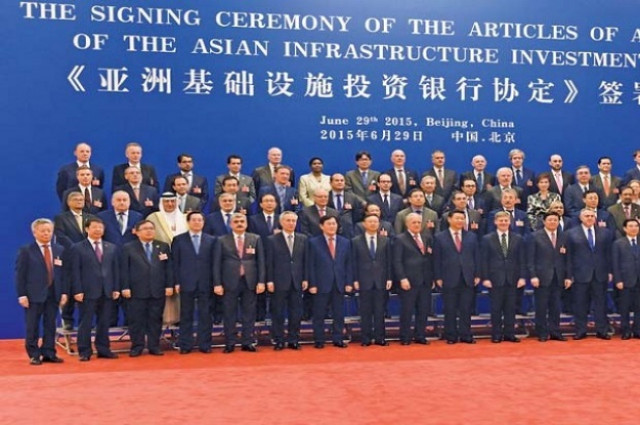New lender in the region: The importance of AIIB for South Asia
Needs too big, lenders too few, say officials

The AIIB will be an important platform to convert the abundant savings available in the region into investments. PHOTO: AFP
South Asia may be an emerging region, but needs to spend trillions of dollars on infrastructure and bring power grids, roads and water supplies up to the required standard as needs of the ever-growing population keep increasing.
This was stated by Zafaruddin, an official affiliated with the China-Pakistan Economic Corridor (CPEC), as he discussed the importance of the Asian Infrastructure Investment Bank (AIIB) for the country.
The official reiterated that the AIIB, envisaged to promote interconnectivity and economic integration in the region and cooperate with existing multilateral development banks, would help South Asia bridge the infrastructure gap.

Other policy options proposed are to establish transparent and well-designed legal, policy and regulatory frameworks, rehabilitation and maintenance of existing infrastructure, improving women’s access to services and decentralising the centre’s authority to local bodies, he said.
Meanwhile, Faisal Afridi, President of the Pak-China Joint Chamber of Commerce and Industries (PCJCCI), said the formation of AIIB would lessen the countries’ dependence on other lenders, reducing their “interference” in the way governments run.
“The AIIB will be an important platform to convert the abundant savings available in the region into investments,” said Afridi. “This would help regional economies, including Pakistan, achieve sustainable growth.
“Needs of the developing world, in terms of infrastructure investment, are too huge for any single institution. The world spends about $1 trillion a year on infrastructure, but the vast majority of that goes to developed countries. Emerging markets and low-income countries face an annual gap of $1 trillion to $1.5 trillion in infrastructure spending.”
He said that the decision by Pakistan to join hands with China and other Asian countries in the establishment of AIIB stems from a new narrative evolved by the government for building economic and political linkages with neighbours and Asian countries.
“The emphasis on finding solutions to the security and economic challenges confronting it, through the collective efforts of the countries of the region, is a pragmatic and visionary initiative,” added Afridi.
Huang Xingiang from Yantai Jiarong Trading Company pointed out that the success of the AIIB needs not only adequate financial instruments but also political will.
“China has enough reasons to be confident in this regard and the international community could be rest assured.
“The AIIB is moving in a right direction, it brings in a lot of expertise. It’s looking at all the options. I think it will come forward with guidelines which everyone will find quite sensible for this situation.”
In terms of governance structure, the AIIB has already adopted a non-resident board of directors in order to improve efficiency and avoid bureaucracy, according to the Articles of Agreement of the AIIB, he mentioned.
Published in The Express Tribune, July 24th, 2015.
Like Business on Facebook, follow @TribuneBiz on Twitter to stay informed and join in the conversation.



















COMMENTS
Comments are moderated and generally will be posted if they are on-topic and not abusive.
For more information, please see our Comments FAQ